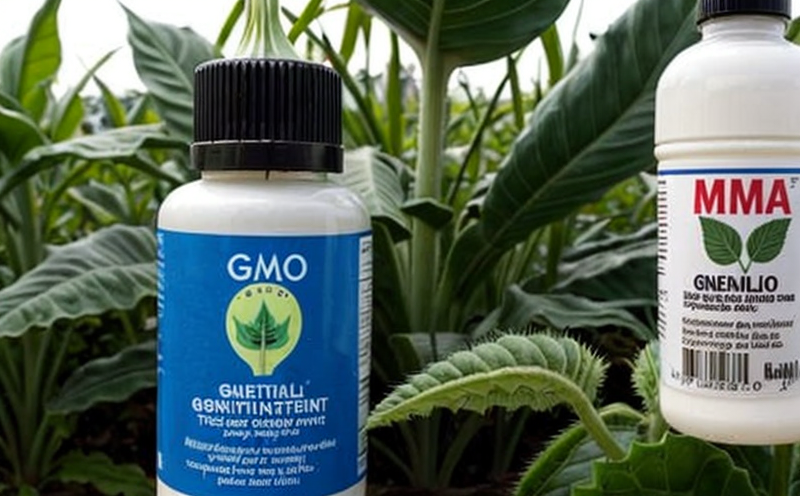ISO 35189 Real-Time PCR GMO Analysis in Baby Foods
The presence of Genetically Modified Organisms (GMOs) in baby foods is a critical concern for the food industry, regulatory bodies, and consumers alike. ISO 35189 provides a standardized approach to detecting GMOs through real-time polymerase chain reaction (PCR) technology. This service ensures that products meet stringent safety and quality standards, thereby protecting consumer health.
Real-time PCR is particularly advantageous in this context as it allows for highly sensitive detection of specific DNA sequences associated with genetically modified organisms. The technique can identify even trace amounts of GMOs present in complex food matrices such as baby foods, which are specifically formulated to be safe and nutritious for infants.
The service encompasses a series of steps from sample collection to final analysis. Initially, the laboratory collects samples that represent the entire batch or lot being tested. These samples undergo rigorous preparation to extract DNA while minimizing contamination risks. The extracted DNA is then subjected to real-time PCR amplification using primers and probes designed specifically for target GMO sequences.
The amplified products are analyzed in real-time as they accumulate, allowing for precise quantification of the specific GMOs present. This technology ensures reliable results with high specificity and sensitivity, making it an indispensable tool for ensuring compliance with international standards like ISO 35189.
Given the importance of this analysis, quality managers and compliance officers can rely on this service to maintain product integrity and consumer trust. R&D engineers benefit from accurate GMO detection data to refine formulations, while procurement teams ensure that only compliant ingredients are used in their products.
- Customer Impact: Compliance with ISO 35189 ensures brand reputation, regulatory compliance, and consumer confidence in the safety of baby foods.
- Safety Assurance: Real-time PCR technology provides accurate quantification, enabling strict adherence to labeling requirements.
- Quality Control: This service helps maintain product quality by identifying potential contamination early in the production process.
The use of ISO 35189 real-time PCR for GMO analysis is not only a legal requirement but also an ethical responsibility. By adhering to this standard, laboratories play a crucial role in safeguarding public health and promoting transparency within the food industry. This service ensures that every batch of baby food produced meets rigorous safety standards, fostering trust between manufacturers and consumers.
Understanding the implications of GMOs is essential for anyone involved in the food sector. By leveraging ISO 35189 real-time PCR analysis, laboratories can contribute to a safer and more informed global food supply chain.
Why It Matters
The significance of GMO testing cannot be overstated, especially in the context of baby foods. Consumers have a right to know what they are feeding their infants, and regulatory bodies expect companies to ensure product safety and compliance with international standards.
GMOs can have various impacts on human health, including allergenicity, nutritional composition changes, and potential environmental effects. Ensuring that the food supply chain is free from unintended GMO contamination protects vulnerable populations such as infants who are more susceptible to adverse reactions.
Compliance with ISO 35189 not only meets regulatory requirements but also enhances brand reputation by demonstrating a commitment to consumer safety. It provides assurance to parents and caregivers that their children's food products meet the highest quality standards.
The real-time PCR technology used in this service offers unparalleled accuracy, enabling precise quantification of GMOs even at trace levels. This level of sensitivity ensures that any potential risks are identified early on, allowing for swift corrective actions if necessary.
By adhering to ISO 35189 standards, laboratories contribute to a safer and more transparent food industry. This service helps maintain public trust in the food supply chain while ensuring compliance with international regulations.
Scope and Methodology
ISO 35189 sets forth specific guidelines for the detection of GMOs using real-time PCR technology. The scope includes establishing a clear protocol for sample preparation, DNA extraction, amplification conditions, and final analysis.
The methodology involves collecting representative samples from baby food batches or lots. These samples are then processed to extract DNA while minimizing contamination risks. The extracted DNA undergoes real-time PCR amplification using primers and probes designed for specific GMO sequences.
The amplified products are analyzed in real-time as they accumulate, providing accurate quantification of the target GMOs present. This technique ensures reliable results with high specificity and sensitivity, making it an indispensable tool for ensuring compliance with international standards like ISO 35189.
By following this standardized approach, laboratories can consistently produce accurate and reproducible results. This consistency is crucial in maintaining product integrity and consumer trust within the food industry.
The use of real-time PCR technology allows for precise quantification of specific GMOs even at trace levels. This level of sensitivity ensures that any potential risks are identified early on, allowing for swift corrective actions if necessary.
Customer Impact and Satisfaction
- Brand Reputation: Compliance with ISO 35189 standards enhances brand reputation by demonstrating a commitment to consumer safety.
- Consumer Trust: Ensuring product safety through rigorous testing fosters trust between manufacturers and consumers.
- Regulatory Compliance: Adherence to international standards ensures that products meet regulatory requirements, avoiding potential legal issues.
- Product Integrity: Precise quantification of GMOs helps maintain product integrity by identifying contamination early in the production process.
- Patient Safety: Ensuring that baby foods are free from unintended GMO contamination protects vulnerable populations such as infants who are more susceptible to adverse reactions.
- Environmental Impact: By reducing the risk of unintentional genetic modifications, this service contributes to a safer and more sustainable food industry.
The impact of ISO 35189 real-time PCR GMO analysis extends beyond just compliance—it ensures that every batch of baby food produced meets rigorous safety standards. This not only protects public health but also promotes transparency within the food supply chain, fostering trust between manufacturers and consumers.





